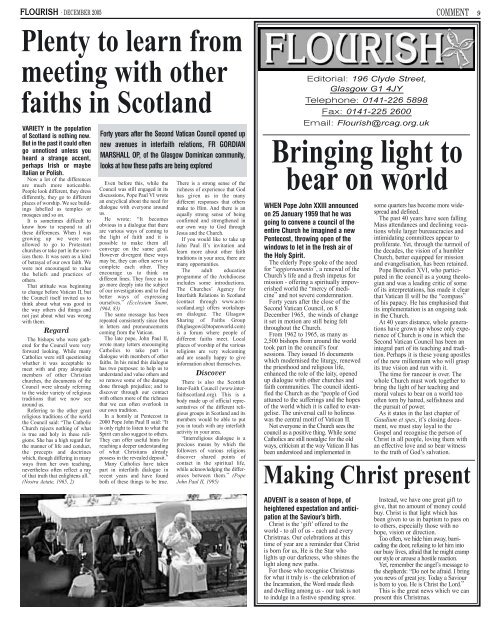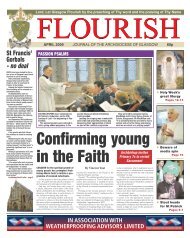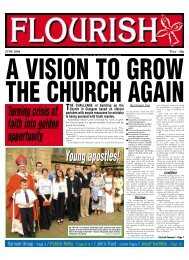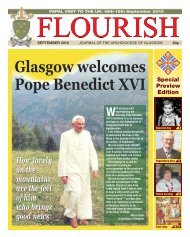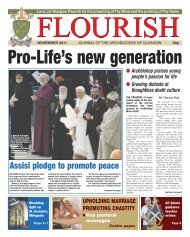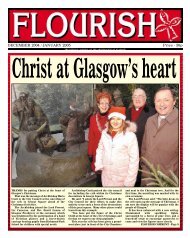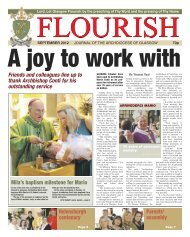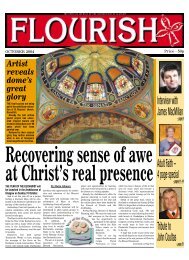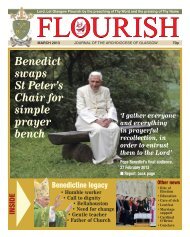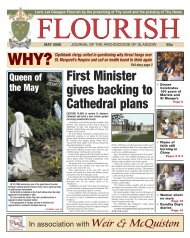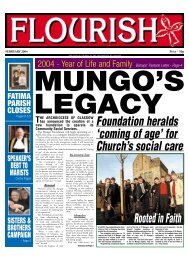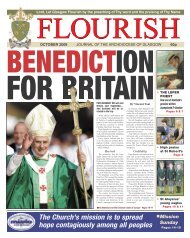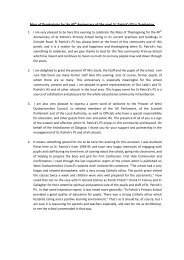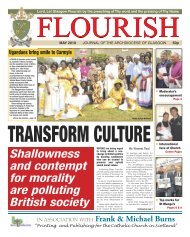December 2005 - Archdiocese of Glasgow
December 2005 - Archdiocese of Glasgow
December 2005 - Archdiocese of Glasgow
- No tags were found...
You also want an ePaper? Increase the reach of your titles
YUMPU automatically turns print PDFs into web optimized ePapers that Google loves.
· DECEMBER <strong>2005</strong>Plenty to learn frommeeting with otherfaiths in ScotlandVARIETY in the population<strong>of</strong> Scotland is nothing new.But in the past it could <strong>of</strong>tengo unnoticed unless youheard a strange accent,perhaps Irish or maybeItalian or Polish.Now a lot <strong>of</strong> the differencesare much more noticeable.People look different, they dressdifferently, they go to differentplaces <strong>of</strong> worship. We see buildingslabelled as temples ormosques and so on.It is sometimes difficult toknow how to respond to allthese differences. When I wasgrowing up we were notallowed to go to Protestantchurches or take part in the servicesthere. It was seen as a kind<strong>of</strong> betrayal <strong>of</strong> our own faith. Wewere not encouraged to valuethe beliefs and practices <strong>of</strong>others.That attitude was beginningto change before Vatican II, butthe Council itself invited us tothink about what was good inthe way others did things andnot just about what was wrongwith them.RegardThe bishops who were gatheredfor the Council were veryforward looking. While manyCatholics were still questioningwhether it was acceptable tomeet with and pray alongsidemembers <strong>of</strong> other Christianchurches, the documents <strong>of</strong> theCouncil were already referringto the wider variety <strong>of</strong> religioustraditions that we now seearound us.Referring to the other greatreligious traditions <strong>of</strong> the worldthe Council said: “The CatholicChurch rejects nothing <strong>of</strong> whatis true and holy in these religions.She has a high regard forthe manner <strong>of</strong> life and conduct,the precepts and doctrineswhich, though differing in manyways from her own teaching,nevertheless <strong>of</strong>ten reflect a ray<strong>of</strong> that truth that enlightens all.”(Nostra Aetate, 1965, 2)Forty years after the Second Vatican Council opened upnew avenues in interfaith relations, FR GORDIANMARSHALL OP, <strong>of</strong> the <strong>Glasgow</strong> Dominican community,looks at how these paths are being exploredEven before this, while theCouncil was still engaged in itsdiscussions, Pope Paul VI wrotean encyclical about the need fordialogue with everyone aroundus.He wrote: “It becomesobvious in a dialogue that thereare various ways <strong>of</strong> coming tothe light <strong>of</strong> faith and it ispossible to make them allconverge on the same goal.However divergent these waysmay be, they can <strong>of</strong>ten serve tocomplete each other. Theyencourage us to think ondifferent lines. They force us togo more deeply into the subject<strong>of</strong> our investigations and to findbetter ways <strong>of</strong> expressingourselves.” (Ecclesiam Suam,1964, 83)The same message has beenrepeated consistently since thenin letters and pronouncementscoming from the Vatican.The late pope, John Paul II,wrote many letters encouragingCatholics to take part indialogue with members <strong>of</strong> otherfaiths. In his mind this dialoguehas two purposes: to help us tounderstand and value others andso remove some <strong>of</strong> the damagedone through prejudice; and todiscover through our contactwith others more <strong>of</strong> the richnessthat we can <strong>of</strong>ten overlook inour own tradition.In a homily at Pentecost in2000 Pope John Paul II said: “Itis only right to listen to what theSpirit can also suggest to others.They can <strong>of</strong>fer useful hints forreaching a deeper understanding<strong>of</strong> what Christians alreadypossess in the revealed deposit.”Many Catholics have takenpart in interfaith dialogue inrecent years and have foundboth <strong>of</strong> these things to be true.There is a strong sense <strong>of</strong> therichness <strong>of</strong> experience that Godhas given us in the manydifferent responses that othersmake to Him. And there is anequally strong sense <strong>of</strong> beingconfirmed and strengthened inour own way to God throughJesus and the Church.If you would like to take upJohn Paul II’s invitation andlearn more about other faithtraditions in your area, there aremany opportunities.The adult educationprogramme <strong>of</strong> the <strong>Archdiocese</strong>includes some introductions.The Churches’ Agency forInterfaith Relations in Scotland(contact through www.actsscotland.org)<strong>of</strong>fers workshopson dialogue. The <strong>Glasgow</strong>Sharing <strong>of</strong> Faiths Group(bkglasgow@btopenworld.com)is a forum where people <strong>of</strong>different faiths meet. Localplaces <strong>of</strong> worship <strong>of</strong> the variousreligions are very welcomingand are usually happy to giveinformation about themselves.DiscoverThere is also the ScottishInter-Faith Council (www.interfaithscotland.org).This is abody made up <strong>of</strong> <strong>of</strong>ficial representatives<strong>of</strong> the different religiousgroups in Scotland and itsmembers would be able to putyou in touch with any interfaithactivity in your area.“Interreligious dialogue is aprecious means by which thefollowers <strong>of</strong> various religionsdiscover shared points <strong>of</strong>contact in the spiritual life,while acknowledging the differencesbetween them.” (PopeJohn Paul II, 1995)Editorial: 196 Clyde Street,<strong>Glasgow</strong> G1 4JYTelephone: 0141-226 5898Fax: 0141-225 2600Email: Flourish@rcag.org.ukCOMMENT 9Bringing light tobear on worldWHEN Pope John XXIII announcedon 25 January 1959 that he wasgoing to convene a council <strong>of</strong> theentire Church he imagined a newPentecost, throwing open <strong>of</strong> thewindows to let in the fresh air <strong>of</strong>the Holy Spirit.The elderly Pope spoke <strong>of</strong> the needfor “aggiornamento”, a renewal <strong>of</strong> theChurch’s life and a fresh impetus formission - <strong>of</strong>fering a spiritually impoverishedworld the “mercy <strong>of</strong> medicine”and not severe condemnation.Forty years after the close <strong>of</strong> theSecond Vatican Council, on 8<strong>December</strong> 1965, the winds <strong>of</strong> changeit set in motion are still being feltthroughout the Church.From 1962 to 1965, as many as2,500 bishops from around the worldtook part in the council’s foursessions. They issued 16 documentswhich modernised the liturgy, renewedthe priesthood and religious life,enhanced the role <strong>of</strong> the laity, openedup dialogue with other churches andfaith communities. The council identifiedthe Church as the “people <strong>of</strong> Godattuned to the sufferings and the hopes<strong>of</strong> the world which it is called to evangelise.The universal call to holinesswas the central motif <strong>of</strong> Vatican II.Not everyone in the Church sees thecouncil as a positive thing. While someCatholics are still nostalgic for the oldways, criticism at the way Vatican II hasbeen understood and implemented insome quarters has become more widespreadand defined.The past 40 years have seen fallingMass attendances and declining vocationswhile larger bureaucracies andintimidating committees appear toproliferate. Yet, through the turmoil <strong>of</strong>the decades, the vision <strong>of</strong> a humblerChurch, better equipped for missionand evangelisation, has been retained.Pope Benedict XVI, who participatedin the council as a young theologianand was a leading critic <strong>of</strong> some<strong>of</strong> its interpretations, has made it clearthat Vatican II will be the “compass”<strong>of</strong> his papacy. He has emphasised thatits implementation is an ongoing taskin the Church.At 40 years distance, whole generationshave grown up whose only experience<strong>of</strong> Church is one in which theSecond Vatican Council has been anintegral part <strong>of</strong> its teaching and tradition.Perhaps it is these young apostles<strong>of</strong> the new millennium who will graspits true vision and run with it.The time for rancour is over. Thewhole Church must work together tobring the light <strong>of</strong> her teaching andmoral values to bear on a world too<strong>of</strong>ten torn by hatred, selfishness andthe pursuit <strong>of</strong> power.As it states in the last chapter <strong>of</strong>Gaudium et spes, it’s closing document,we must stay loyal to theGospel and recognise the person <strong>of</strong>Christ in all people, loving them withan effective love and so bear witnessto the truth <strong>of</strong> God’s salvation.Making Christ presentADVENT is a season <strong>of</strong> hope, <strong>of</strong>heightened expectation and anticipationat the Saviour’s birth.Christ is the ‘gift’ <strong>of</strong>fered to theworld - to all <strong>of</strong> us - each and everyChristmas. Our celebrations at thistime <strong>of</strong> year are a reminder that Christis born for us, He is the Star wholights up our darkness, who shines thelight along new paths.For those who recognise Christmasfor what it truly is - the celebration <strong>of</strong>the Incarnation, the Word made fleshand dwelling among us - our task is notto indulge in a festive spending spree.Instead, we have one great gift togive, that no amount <strong>of</strong> money couldbuy. Christ is that light which hasbeen given to us in baptism to pass onto others, especially those with nohope, vision or direction.Too <strong>of</strong>ten, we hide him away, barricadingthe door, refusing to let him intoour busy lives, afraid that he might crampour style or arouse a hostile reaction.Yet, remember the angel’s message tothe shepherds: “Do not be afraid. I bringyou news <strong>of</strong> great joy. Today a Saviouris born to you. He is Christ the Lord.”This is the great news which we canpresent this Christmas.


